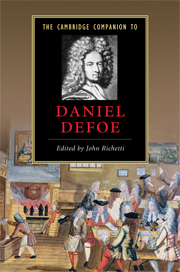Book contents
- Frontmatter
- Introduction
- 1 Defoe: the man in the works
- 2 Defoe’s political and religious journalism
- 3 Defoe, commerce, and empire
- 4 Defoe and criminal fiction
- 5 Money and character in Defoe’s fiction
- 6 Defoe’s Tour and the identity of Britain
- 7 Defoe as narrative innovator
- 8 Gender and fiction in Moll Flanders and Roxana
- 9 Defoe and London
- 10 Robinson Crusoe: varieties of fictional experience
- 11 Defoe: satirist and moralist
- 12 Defoe and poetic tradition
- Further Reading
- Index
8 - Gender and fiction in Moll Flanders and Roxana
Published online by Cambridge University Press: 28 March 2009
- Frontmatter
- Introduction
- 1 Defoe: the man in the works
- 2 Defoe’s political and religious journalism
- 3 Defoe, commerce, and empire
- 4 Defoe and criminal fiction
- 5 Money and character in Defoe’s fiction
- 6 Defoe’s Tour and the identity of Britain
- 7 Defoe as narrative innovator
- 8 Gender and fiction in Moll Flanders and Roxana
- 9 Defoe and London
- 10 Robinson Crusoe: varieties of fictional experience
- 11 Defoe: satirist and moralist
- 12 Defoe and poetic tradition
- Further Reading
- Index
Summary
Defoe's novels - especially his five fictional autobiographies, Robinson Crusoe, Captain Singleton, Moll Flanders, Colonel Jack, and Roxana - can be an interpretive nightmare for those trying to locate in them a stable authorial voice or point of view. In these works, Defoe returns repeatedly to the same narrative experiment: the representation of a self in the process of narrative retrospection. To sustain the illusion that these representations are not in fact fictions but true accounts of real people, he deploys a distinctive and complex rhetorical strategy: in each case, he performs an authorial disappearing act by assuming the voice of a first-person narrator looking back at his or her life and attempting to make sense of it through the act of writing. The voices he impersonates in this way are neither simple nor internally unified. In fact, they have sometimes been called “double” because the temporal process involved in portraying an older consciousness reflecting on its own past errors and adventures simultaneously entails an act of distancing and identification; the perspective of penitent maturity from which these narrators “speak” is tempered by - if not at times in tension with - an intimate appreciation of the extenuating circumstances that prompted their actions and conditioned their personal choices along the way. Into all but one of these “double-voiced” narratives, moreover, Defoe introduces yet another voice and another narrative frame: an impersonated editor who, in a preface to the memoir, promises profit as well as pleasure in setting the narrator's personal history before the public.
- Type
- Chapter
- Information
- The Cambridge Companion to Daniel Defoe , pp. 139 - 157Publisher: Cambridge University PressPrint publication year: 2009
- 2
- Cited by

